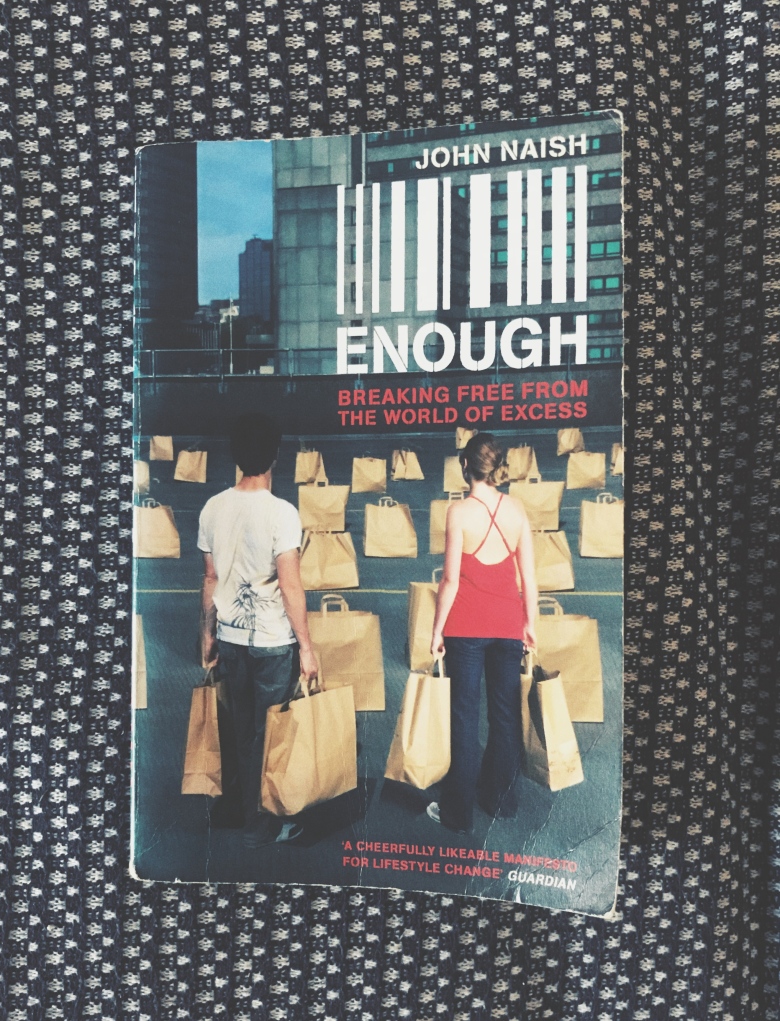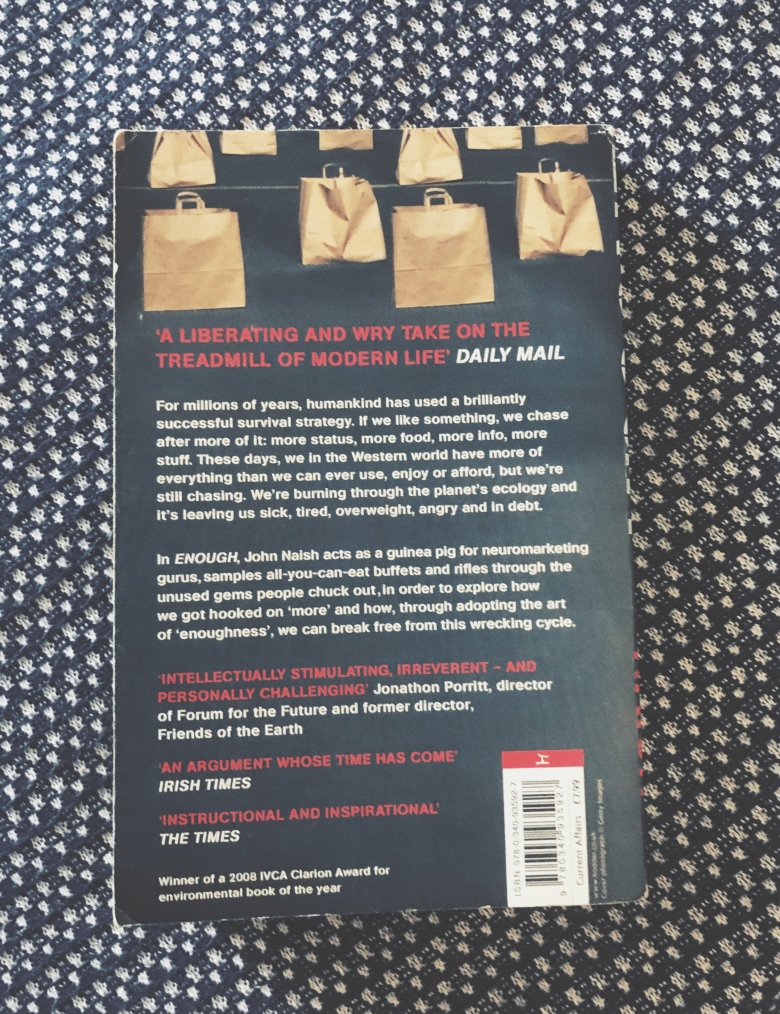
We drown out the big questions by marching behind the brass band of infinite ambition. It’s a march that apparently need never end: today’s idea of success increasingly involves attaining unprecedented levels of health, power, and celebrity.
—John Naish Enough. Breaking Free from the World of Excess
This quote is from 2008. It resonates with pretty much every time frame from the late 80ies to today. But while the consumer culture of the last century was too analog to even imagine, John Naish would probably have never envisioned how manifold one could present one’s infinite ambitions on today’s social media nightmares like Facebook, Instagram, or LinkedIn. We are drowning in everyone’s opportunities. We are drowning in various ways to buy happiness. We are drowning in unwanted goods we don’t need any longer because we found something much better. This is as true in 2020 as it was in 2008, when John Naish wrote his book Enough – Breaking free from the world of excess.
In eight chapters and one afterword, Naish does his best to analyze the various ways our capitalist and consumer culture defines the meaning of “enough.” He covers as diverse topics as Enough Food, Enough Information, Enough still, Enough Options, Enough Work, and — being the ADHD anxiety depression freak that I am — my favorite, Enough Happiness. You could read this book just like any other, or you only read the topics you’re most interested in, leaving out others you don’t care about. Still, you find a thorough investigation and analysis of how we came to where we are now (or rather were back in 2008).
Information Overload
Take, for example, Enough Information. Back in 2008, TV news reports were one of the most important news sources most people turned to whenever they wanted to see what was going on in the world. Two years before, amid my mental health tour de force, I quit TV news for good and never looked back. Apart from a short stint in New York, where I watched a local news channel because of a minor terror incident, I haven’t seen TV news footage in more than a decade. John Naish argues similarly in Enough, stating that TV news coverage focuses only on the absolute worst while a focus on local news will prove that the world isn’t that bad. He also never owned a TV (I ditched mine in 2012) because, well, absolute overload. Today, with Facebook, Twitter, and newspaper apps offering push services, it’s even harder to escape the flood of predominantly negative 24/7 news coverage.
But ‘information’ doesn’t start and end with the news — even though John Naish, who (still) works as a journalist in the UK, could have focused solely on this part of the problem. He also includes the fact that we’re getting much too much information per se throughout our days, be it a text message, WhatsApp, e-mail, or a mention/retweet/like/reply on Twitter/FB/Insta. Even more than in 2008, thanks to our smartphones, we are available 24/7 — and people expect us to be. Have you ever had a discussion with someone because you read their WhatsApp but didn’t reply immediately or within the next hour? Ever had a friend who was angry at you because you didn’t instantly reply to their FB message even though he could see YOU’VE READ IT, so why didn’t you reply? Like what the actual f*ck?
Naish covers this topic too, though more regarding text messaging and e-mails. He underlines the fact that constant interruptions are not a way to function, work, or live productively:
It takes about 4 minutes to recover from an electronic interruption and regain your train of thought. So if you have 30 e-mails a day and look up 30 times, that’s 120 minutes of recovery time.
Think about it. Two hours every day just because your phone vibrates. It need not be an e-mail. It could be any messenger, Instagram, TikTok, or anything else no one really needs, but your FOMO keeps you alert and active. It costs you valuable time. When I want to avoid distraction at all costs, I usually put my phone in flight mode. Actually, I use flight mode rather regularly and it’s one of my favorite features, especially to calm my ADHD fuzzybrain. Flight mode keeps the world out and helps me relax and focus on my work, my play, and my life.
Do you remember the times ten, 15 years ago when you could use your phone as an alarm clock even when it was turned off? Not anymore. In the era of smartphones, which keep you on edge 24/7, and marketers developing apps that scream for your constant interaction, nobody wants you to turn off your phone. That would border on a brave act of self-care, taking a break from the constant barrage of notifications and noise that are possibly detrimental to your mental health.
All work and no play…
But enough of digital gadget bashing. Naish has a broader focus regarding how much ‘enough’ there is in this world — today even more so than 12 years ago. In Enough Work, Naish analyzes how we went from working and earning only as much as we needed to sustain ourselves to today when we feel the acquisition of stuff we don’t need is more important than free time and a certain degree of independence.
Creating the illusion of consumerism being the only way to express one’s personality, our society doesn’t value the luxury of having a sufficient amount of free time available, possibly in exchange for earning less money. So people who do not work full time but prefer to have less money and more time — people like me, depending on my freelance projects — may be seen as traitors by some. We don’t work 8 or 9 hours a day, earning enough to keep the wheels of consumerism turning, so we are not valuable members of society. It’s a scandal we are allowed to take vacations at all. Naish emphasizes this change in perspective regarding work when he writes:
[…] Many people chose to earn only as much as they needed to pay for basic food, clothing and shelter. Why go to work on Monday mornings if you don’t need to? That balancing act was thwarted when consumerism successfully persuaded people that what they really wanted was not more time, but more material goods than they already had.
The problem is that personal freedom only goes as far as you have sufficient funds. When part-time work earns you enough to sustain a living — which may be the case depending on your education and work experience — then this concept works well. But the moment children, mortgages, credit cards, cars, and other issues are entering the picture, it may be less about consumerism as a practice of personal freedom and more about pure survival. So while I personally agree with Naish and have a rather unconventional work biography (which is also a result of my mental health issues), we should never forget that many people all over the world don’t have the luxury, education, or funds to freely decide how (much) they want to work.
How much is too much?
Still, consumerism is the source of a lot of problems we have been facing for some time now. Enough Stuff and Enough Options both deal with how consumerism and its consequences don’t make our lives any easier in the long run. Too many options can lead to decision fatigue (not just in ADHD fuzzybrains), meaning that we feel too overwhelmed by the wide range of possibilities to reach any decision at all. And this is not limited to shopping options.
Before I decluttered my wardrobe (four times so far…) it often took me up to an hour to find something to wear because I simply had too much. Today, with a much smaller closet, I’m also much faster at finding what I want to wear. This may sound familiar to some of you. No matter what, more stuff and more options don’t equal more happiness. It only means you spend more time trying to reach decisions and taking care of all your things. And it also means you have to work more hours to earn more money to afford more stuff and options.
Naish provides a wonderful quote that I want to share with you to conclude this paragraph:
Shopping gives you a sense of choice and power which is often absent from the rest of your life.
Are you happy enough?
One of my favorite chapters of John Naish’s Enough is Enough Happiness, which deals with the happiness and self-improvement industry that flourishes on the premise that feeling down is a vice we need to get rid of. Don’t get me wrong: I suffered from depression because of my anxiety issues and ADHD and I still get very VERY low from time to time. I suffer from anxiety and can spend hours imagining the worst outcomes of the most basic situations. So I am all here for working on the self and not giving in to every little bad vibe that grazes on my frontal lobe.
BUT this has also become a lucrative industry. Furthermore, it is simply not realistic to be happy and content all the time. You would either be on drugs or out of your mind to not go through some lows from time to time. That is fine. It is still healthy, even if it doesn’t feel like it. And it’s human. There’s nothing wrong with you. One woman’s pleasure is another one’s plight — that’s life.
Naish taking on the happiness industry and its mantra that it will bring you never-ending happiness is an interesting and entraining read. Even more important is the fact that he broaches the subject at all. More often than not, this industry exists as a sort of shadow society that everyone knows about, but hey, as long as no one is hurt, let them improve themselves and don’t talk about it. And that may be okay, even though this sort of happiness can be pricey. But it is still important to tackle the topic, to point out that everlasting happiness is a fairytale and that certain lows are indeed just fine. But if it gets worse, you should not just go and buy a book and a sound bowl but maybe consider seeing an expert to get professional help — not for eternal happiness, but for mental health.
Conclusion
While reading John Naish Enough I got the impression that the author was ahead of his time. While 2008, 2009 saw a growing awareness of the dark sides of capitalism thanks to the financial crisis, a lot of his arguments that refer not only to consumerism but also sustainability and environmental issues have become more urgent and therefore present in the media and politics. So even though the book refers to cellphones rather than smartphones when discussing the growing distractions caused by text messaging and e-mail, it has lost none of its relevance and poignancy over the last 12 years.
If you want to enjoy a critical reflection on our society of never enoughs, riddled with a charming British sense of humor, get yourself a copy of John Naish’s Enough. It could help you find your very own point of having, being, and feeling enough — and enjoy it. In several respects.

